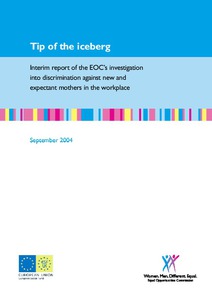Tip of the iceberg: interim report of the EOC's investigation into discrimination against new and expectant mothers in the workplace
"Every year, in England and Wales alone, around 1,000 women take legal action against their employer claiming they were sacked because of their pregnancy. This is likely to be the tip of the iceberg. Thousands of women contact the Equal Opportunities Commission (EOC) and other organisations eve...
| Institution: | ETUI-European Trade Union Institute |
|---|---|
| Format: | TEXT |
| Language: | English |
| Published: |
Manchester
2004
EOC |
| Subjects: | |
| Online Access: | https://www.labourline.org/KENTIKA-19293043124910112259-Tip-of-the-iceberg-interim-rep.htm |
| Summary: | "Every year, in England and Wales alone, around 1,000 women take legal action against their employer claiming they were sacked because of their pregnancy. This is likely to be the tip of the iceberg. Thousands of women contact the Equal Opportunities Commission (EOC) and other organisations every year about their maternity or pregnancy rights at work. Over 500 women have been in touch with us since we launched the investigation to tell us their experiences. These are the sorts of problems they face:
- during pregnancy: being refused a job, dismissed, selected for redundancy, demoted, losing out on pay, bonuses or other benefits, being exposed to health and safety risks or subjected to unpleasant or hostile treatment
- during maternity leave: being made redundant, not consulted on changes to the organisation, passed over for promotion, or deprived of the benefit of pay rises or bonuses
- on return to work : being denied flexible hours or forced to return to a lower-status job.
Whilst only 350,000 women are pregnant in any one year in Great Britain, out of almost 10 million working women of childbearing age, many women will experience pregnancy at work at least once. Pregnancy discrimination can hit the income and health of their families very hard and the effects can be long-lasting. Because so few women are pregnant at any one time, pregnancy is an unfamiliar experience for most employers and does present challenges. When discrimination occurs, the economy and businesses lose out on talent as well as facing the costs of replacing staff and, sometimes, legal costs. Some women fear the effect of pregnancy on their careers and there is evidence that women are having fewer children than they would ideally choose (OECD, 2003). This is happening at a time when the birthrates in England, Scotland and Wales are declining." |
|---|---|
| Physical Description: | 36 p. Digital |

